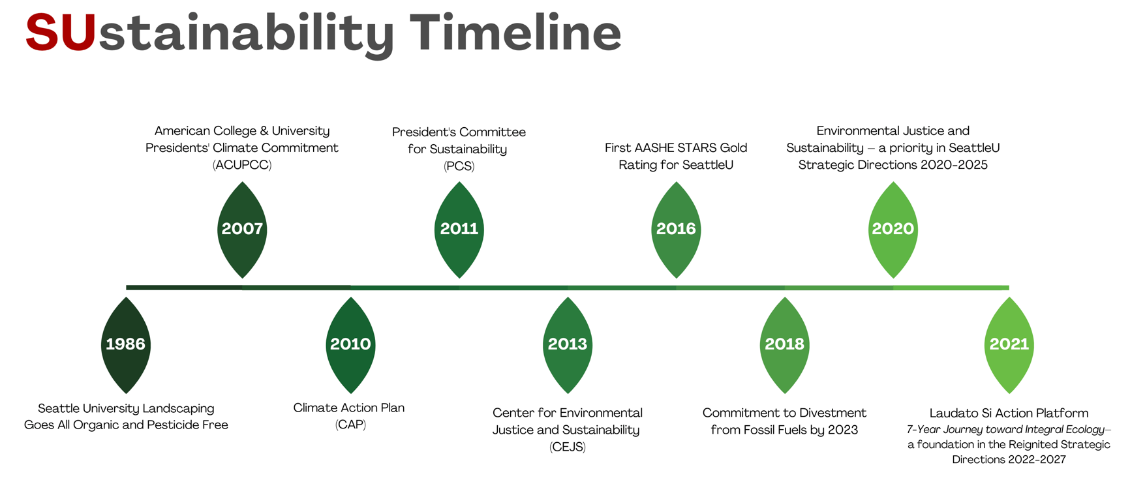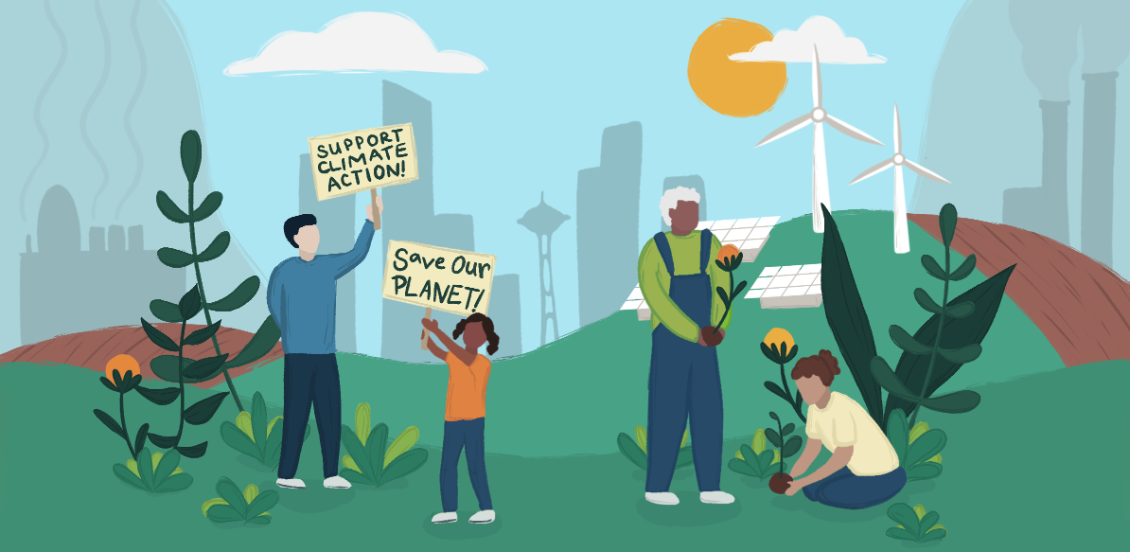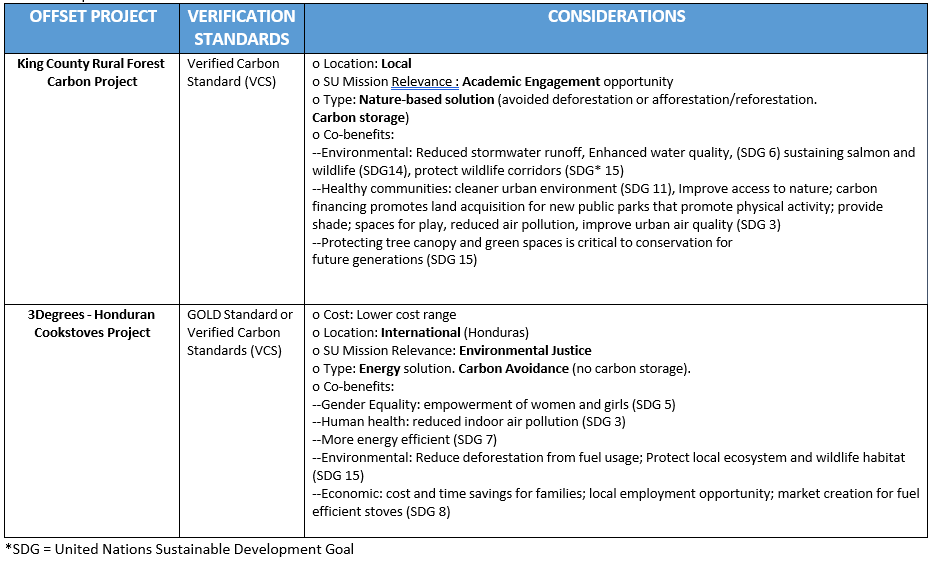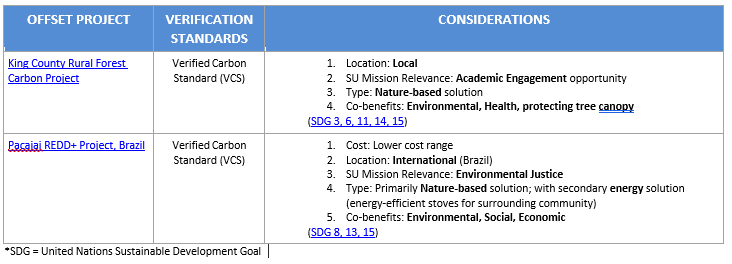Climate Action
/142x0:2258x1350/prod01/channel_34/media/seattle-university/web-redesign-6-25/Canoe-copy.jpg)
PROGRESS TOWARD SU’S CLIMATE ACTION PLAN GOALS
 SU'S Climate Commitment
SU'S Climate Commitment
In 2007, Seattle University became a charter signatory of the American College & University President's Climate Commitment (ACUPCC). We believe that higher education must educate students and conduct research to develop the social, environmental, economic and technological solutions to reverse global climate change and lead by example to reduce our campus’ emissions.
The ACUPCC Commitment required signatories to:
- Establish an institutional structure
- Complete an Emissions inventory within a year and annually thereafter
- Establishing a climate neutrality action plan setting a target date and interim milestones for achieving climate neutrality
- Take immediate steps to reduce greenhouse gas emissions
- Integrate sustainability into the curriculum
- Make the climate action plan, inventory and progress reports publicly available
Climate Action Plan (2010) and Laudato Si Action Plan (2023)
In 2010, Seattle University created a Climate Action Plan (CAP) to further deepen and strengthen its commitment to sustainability. The CAP describes the university’s intentions to more comprehensively address climate change and advance sustainability in the Academics, Co-curricular programs, Marketing and Communications, and Operations.
In 2011, The President’s Committee for Sustainability (PCS) was convened to oversee:
- The implementation of Seattle University's Climate Action Plan
- The integration of sustainability initiatives across the Seattle University community
- ACADEMICS: Expand sustainability in the curriculum
- CO-CURRICULAR PROGRAMS and ENGAGEMENT: Expand sustainability in co-curricular programs and educate SU's campus community about climate change and sustainability outside the classroom
- OPERATIONS: Increase sustainable practices in university operations and eliminate greenhouse gas emissions from operations and transportation
- MARKETING & COMMUNICATIONS: Share our sustainability knowledge and expertise with others
In response to Pope Francis’s invitation to higher education institutions, Seattle University's (SU) President Peñalver signed a letter of commitment in September 2021 to participate in the “Seven-Year Journey Towards Integral Ecology”and the Laudato Si’ Action Platform (LSAP).
The LSAP Leadership team was created in Fall 2022 to follow in the footsteps of the President's Committee for Sustainability (PCS, 2011-2022). with the goal to oversee, facilitate, and adequately coordinate the implementation of the LSAP priorities and goals. The LSAP team adopted, in February 2023, SU's Laudato Si’ Action Plan, which includes four main priorities and 27 goals.
Reducing SU’s Carbon Footprint
Seattle University has committed to work towards carbon neutrality or zero Greenhouse Gas emissions. SU’s initial Climate Action Plan was to reduce emissions by at least 12% by 2020 and by at least 51% by 2035 from the baseline year 2009.
In FY 2021 and FY2022, SU reached carbon neutrality for scopes 1 and 2 through investments in new campus infrastructure and the purchase of offsets.
Download the Carbon Footprint Reduction Infographic (2022)
FY2009–FY2023 GHG Emissions Over Time
| Fiscal Year |
Total Emissions (GHG MTCDE) |
Change in Metric Tons from FY09 | % Change in Total Emissions from FY09 | Net Emissions (GHG MTCDE) | Change in Net Emissions from FY09 | % Change in Net Emissions from FY09 |
|---|---|---|---|---|---|---|
| 2009 | 19533 | 0 | 19390 | 0 | ||
| 2010 | 18076 | -1457 | -7.5% | 17827 | -1563 | -8.1% |
| 2011 | 17288 | -2245 | -11.5 | 16540 | -2851 | -14.7% |
| 2012 | 17063 | -2469 | -12.6% | 12704 | -6687 | -34.5% |
| 2013 | 18130 | -1403 | -7.2% | 14798 | -4593 | -23.7% |
| 2014 | 15810 | -3723 | -19.1% | 15620 | -3771 | -19.4% |
| 2015 | 15635 | -3898 | -20.0% | 15431 | -3959 | -20.4% |
| 2016 | 17130 | -2403 | -12.3% | 16877 | -2514 | -13.0% |
| 2017 | 17573 | -1959 | -10.0% | 17289 | -2101 | -10.8% |
| 2018 | 16763.9 | -2769 | -14.2% | 16493.5 | -2897 | -14.9% |
| 2019 | 16697.4 | -2835 | -14.52% | 16484.87 | -2906 | -15.0% |
| 2020 COVID affected year |
13362.8 | -6170 | -31.59% | 13254.0 | -6136 | -31.6% |
| 2021 COVID affected year |
5876.9 | -13655.76 | -69.91% | 3145.3 | -16245.1 | -83.78% |
| 2022 COVID affected year |
11292.36 | -8240.25 | -42.19% | 7426.0 | -11964.5 | -61.70% |
| 2020 (Goal) | -12.0% | |||||
| 2035 (Goal) | -51.0% |
While Seattle University is committed to reducing emissions through on-campus projects and programs, it recognizes that the need for climate action is urgent and SU will be unable to reduce 100% of its emissions through its own actions. As President Eduardo Peñalver shared during Earth Month 2022, “We're currently developing a plan that will completely eliminate our (university’s) use of natural gas. Until that plan can be fully implemented, we will continue to take responsibility for our direct greenhouse gas emissions by purchasing high-quality carbon offsets that have multiple environmental and social benefits.”
In 2022, a carbon offset committee evaluated the use of high-quality offsets as a supplemental strategy for achieving climate neutrality. The committee recommended that the University purchase third-party-verified offset projects that provide significant social, environmental, and economic benefits to communities that go beyond the benefits of GHG reductions while offering significant academic benefits to the Seattle University community and are in accordance with Laudato Si’s call for Integral Ecology and protecting creation and SU's Jesuit mission of academic excellence, sustainability, and empowering leaders for a just and humane world.
Learn more about carbon offsets. For a brief overview of SU's carbon offsets purchasing, see this SU Newsroom article.
SU’s Carbon Offset Projects FY23
FY2009–FY2023 GHG Emissions Over Time
| Fiscal Year |
Total Emissions (GHG MTCDE) |
Change in Metric Tons from FY09 | % Change in Total Emissions from FY09 | Net Emissions (GHG MTCDE) | Change in Net Emissions from FY09 | % Change in Net Emissions from FY09 |
|---|---|---|---|---|---|---|
| 2009 | 19533 | 0 | 19390 | 0 | ||
| 2010 | 18076 | -1457 | -7.5% | 17827 | -1563 | -8.1% |
| 2011 | 17288 | -2245 | -11.5 | 16540 | -2851 | -14.7% |
| 2012 | 17063 | -2469 | -12.6% | 12704 | -6687 | -34.5% |
| 2013 | 18130 | -1403 | -7.2% | 14798 | -4593 | -23.7% |
| 2014 | 15810 | -3723 | -19.1% | 15620 | -3771 | -19.4% |
| 2015 | 15635 | -3898 | -20.0% | 15431 | -3959 | -20.4% |
| 2016 | 17130 | -2403 | -12.3% | 16877 | -2514 | -13.0% |
| 2017 | 17573 | -1959 | -10.0% | 17289 | -2101 | -10.8% |
| 2018 | 16763.9 | -2769 | -14.2% | 16493.5 | -2897 | -14.9% |
| 2019 | 16697.4 | -2835 | -14.52% | 16484.87 | -2906 | -15.0% |
| 2020 COVID affected year |
13362.8 | -6170 | -31.59% | 13254.0 | -6136 | -31.6% |
| 2021 COVID affected year |
5876.9 | -13655.76 | -69.91% | 3145.3 | -16245.1 | -83.78% |
| 2022 COVID affected year |
11292.36 | -8240.25 | -42.19% | 7426.0 | -11964.5 | -61.70% |
| 2020 (Goal) | -12.0% | |||||
| 2035 (Goal) | -51.0% |
Full Divestment at SU
Seattle University was the first Jesuit university in the world to commit to full fossil fuel divestment. In 2018, Seattle U's Board of Trustees voted to divest from fossil fuels with goals to, "by June 30, 2023, fully divest the marketable portion of the endowment from any investments in companies owning fossil fuel reserves,” and “to achieve a 50 percent reduction by December 31, 2020.” In March 2020, the 50% reduction was reached, nine months ahead of schedule. In June 30, 2023, SU fully divested from fossil fuels.
How You Can Reduce Your Footprint
Want to reduce your own carbon footprint? Learn more at our Campus Sustainability and Get Involved pages! Also check out the Small Business Climate Impact Guide, created by SU graduate students from the Albers School of Business and Economics to support businesses with the implementation of step-by-step strategies to lower their greenhouse gas emissions.


